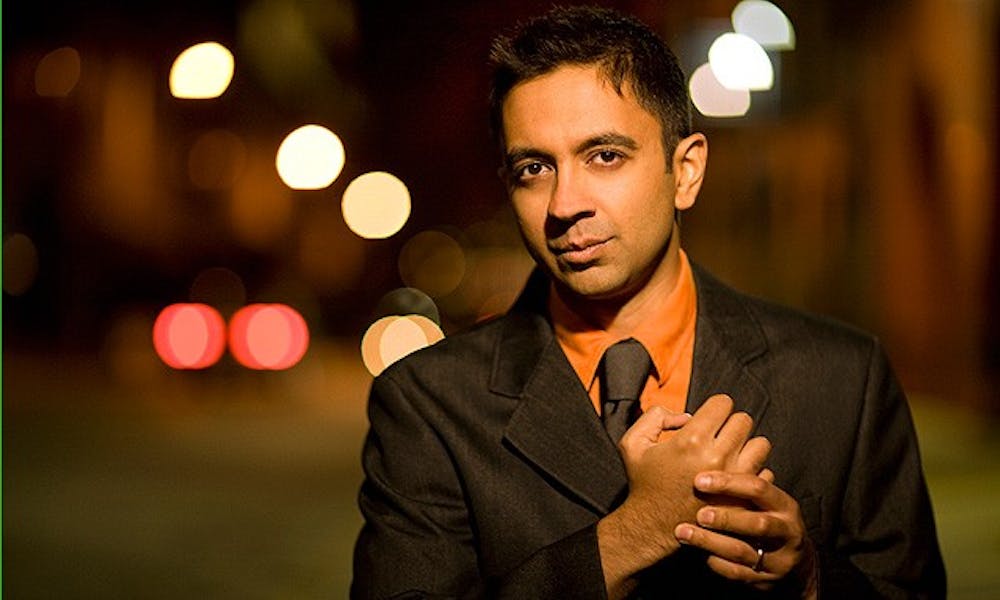Vijay Iyer is living proof that contemporary jazz isn’t static.
Iyer, a self-taught pianist and composer, combines a profound understanding of the jazz tradition and its history with a tireless creative energy to bring the genre headfirst into the 21st century.
Iyer will perform Friday at Duke with bassist Stephan Crump and drummer Marcus Gilmore—giving Duke students and Durham residents the chance to see one of the most innovative groups working in jazz today, said Director of Duke Performances Aaron Greenwald.
“This feels like a totally contemporary jazz trio,” Greenwald said. “Jazz spends a lot of time trying to figure out its history and how musicians ought to relate to that history, and this trio has captured that balance in an especially compelling fashion. You don’t have to be a jazz fan to be moved or blown away by what will be happening on stage.”
Prior to the concert, Iyer will give a talk with Jonathan Mattingly, associate professor of mathematics and statistical science, entitled “On Math and Music.”
The conversation will cover certain mathematical concepts that exist in Indian music and visual arts as well as his own compositions, Iyer said.
Indeed, Iyer’s playing draws on a range of vocabularies, from mathematical structures and South Indian Karnatak music to electronic compositions and contemporary pop.
“If most jazz pianists’ playing reflects a certain history that runs through stride and bebop and the jazz of Ornette Coleman in the 1970s, Vijay’s music is informed by a trajectory that embraces all of those things but also includes different types of experimental music and these different classical traditions,” Greenwald said.
Throughout the past fifteen years, Iyer has built up an impressive body of work with musicians of different backgrounds. His 2004 collaboration with poet Mike Ladd, the song cycle In What Language?, inhabits a world between jazz and hip-hop and stands as a striking document of the post-Sept. 11 political landscape. Iyer has similarly channeled disparate influences into improvisational music alongside alto saxophonist Rudresh Mahanthappa and as part of the experimental collective Fieldwork.
Recently, Iyer has charted new territory with Crump and Gilmore. The group’s latest release, Historicity, has been heralded as a paragon for the future of the jazz trio. The album topped virtually every end-of-the-year list in its category: The New York Times, NPR, The Chicago Tribune and The Los Angeles Times all selected it as the most important jazz record of 2009.
“I have to keep it in perspective,” Iyer said of the near-universal critical acclaim. “I can’t get too attached to that kind of thing. Above all, it gives me more opportunities to push the music a little farther, especially in the course of playing, because that’s where the discovery happens.”
Historicity showcases the trio’s dynamism and versatility, juxtaposing sophisticated original compositions with inspired covers of Stevie Wonder and Andrew Hill tunes. Perhaps the most striking choice of source material is M.I.A.’s “Galang,” which the group reimagines as a dark groove driven by powerful hits in the bass and the left hand of the piano. The title track, one of Iyer’s own contributions, relies on an intricate rhythmic fabric that evolves spontaneously in time and timbre as the musicians propose alternating melodic and harmonic ideas.
“With Historicity, the trio has become a force,” Greenwald said. “When I last saw them, they were playing with each other in a fashion that I’m not sure that I’ve ever seen among improvising musicians before. There was tautness to the enterprise that was thrilling.”
On top of his considerable success as a jazz musician, Iyer has carved out a parallel career as an interdisciplinary scholar. He earned a Ph.D. in technology and the arts at the University of California, Berkeley, and wrote a dissertation exploring rhythmic perception and cognition in various musical traditions of the African diaspora. He has contributed research in fields as diverse as consciousness studies and jazz musicology and currently serves on the faculty at New York University, the New School and the School for Improvisational Music.
Iyer said he does not see a clear dividing line between his musical and academic work.
“I don’t really try to keep them separate,” he said. “I do draw a lot of inspiration from some of the ideas in my thesis. How music works, what it does for and to people—it’s all part of the mix for me.”
The Vijay Iyer trio will perform Dec. 3 at 8 p.m. in the Reynolds Industries Theater. Tickets are available at tickets.duke.edu.
Get The Chronicle straight to your inbox
Signup for our weekly newsletter. Cancel at any time.

